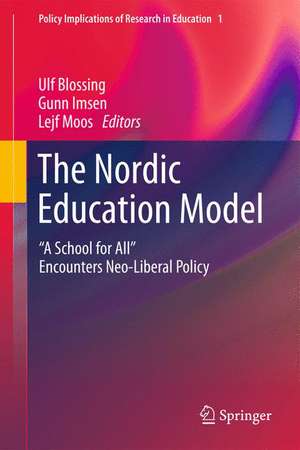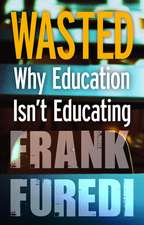The Nordic Education Model: 'A School for All' Encounters Neo-Liberal Policy: Policy Implications of Research in Education, cartea 1
Editat de Ulf Blossing, Gunn Imsen, Lejf Moosen Limba Engleză Hardback – 30 oct 2013
Against this background, The Nordic Education Model traces the rise of neo-liberal policies that have been enacted by those who believe the School for All ideology does not produce the knowledge and skills that students need to succeed in an increasingly competitive and global marketplace. It examines the conflict between these two ideas and shows how neo-liberal technologies affect the Nordic model in different ways.
The authors also show how social technologies are being interpreted in different ways in actual school practices. This process of translating national regulations into internal sense builds on the values in the culture to which they are introduced.
In the end, this book reveals that a Nordic model can constitute a delicate balance between traditional values, institutionalized practices, and contemporary, neo-liberal forms of governance and policies. It may be argued from a new institutional perspective that the main structures of the Nordic educational model will sustain as long as the deeply rooted Nordic culture survives in the globalised society.
| Toate formatele și edițiile | Preț | Express |
|---|---|---|
| Paperback (1) | 731.48 lei 38-44 zile | |
| SPRINGER NETHERLANDS – 23 aug 2016 | 731.48 lei 38-44 zile | |
| Hardback (1) | 741.62 lei 38-44 zile | |
| SPRINGER NETHERLANDS – 30 oct 2013 | 741.62 lei 38-44 zile |
Preț: 741.62 lei
Preț vechi: 975.81 lei
-24% Nou
Puncte Express: 1112
Preț estimativ în valută:
141.93€ • 146.92$ • 119.96£
141.93€ • 146.92$ • 119.96£
Carte tipărită la comandă
Livrare economică 01-07 martie
Preluare comenzi: 021 569.72.76
Specificații
ISBN-13: 9789400771246
ISBN-10: 940077124X
Pagini: 205
Ilustrații: XVI, 244 p. 10 illus., 7 illus. in color.
Dimensiuni: 155 x 235 x 22 mm
Greutate: 0.54 kg
Ediția:2014
Editura: SPRINGER NETHERLANDS
Colecția Springer
Seria Policy Implications of Research in Education
Locul publicării:Dordrecht, Netherlands
ISBN-10: 940077124X
Pagini: 205
Ilustrații: XVI, 244 p. 10 illus., 7 illus. in color.
Dimensiuni: 155 x 235 x 22 mm
Greutate: 0.54 kg
Ediția:2014
Editura: SPRINGER NETHERLANDS
Colecția Springer
Seria Policy Implications of Research in Education
Locul publicării:Dordrecht, Netherlands
Public țintă
ResearchCuprins
Foreword.- 1. Nordic Schools in a Time of Change.- PART 1: Country Cases.- 2. A School for Every Child in Sweden.- 3. The Norwegian School for All – Historical Emergence and Neoliberal Confrontation.- 4. A School for Less than All in Denmark.- 5. A School for All in Finland.- 6. The Development of a School for All in Iceland: Equality, Threats and Political Conditions.- PART 2: Thematic Chapters.- 7. A Social Democratic Response to Market-led Education Policies: Concession or Rejection?.- 8. Progressive Education and New Governance in Denmark, Norway and Sweden.- 9. Assessing Children in the Nordic Countries - Framing, Diversity and Matters of Inclusion and Exclusion in a School for All.- 10. One School – Different Worlds: Segregation on the Basis of Freedom of Choice.- 11. Nordic Upper Secondary School: Regular and Irregular Programmes – or Just One Irregular School for All?.- 12. Dropout in a School for All: Individual or Systemic Solutions?- 13. Schools for All: A Nordic Model.
Textul de pe ultima copertă
This book presents a detailed analysis of the educational model in Nordic European countries. It describes the traditional idea of education for all, which can be characterized by the right for every child to have an education of equal quality in a common school for all pupils regardless of social class, abilities, gender, or ethnicity.
Against this background, The Nordic Education Model traces the rise of neo-liberal policies that have been enacted by those who believe the School for All ideology does not produce the knowledge and skills that students need to succeed in an increasingly competitive and global marketplace. It examines the conflict between these two ideas and shows how neo-liberal technologies affect the Nordic model in different ways.
The authors also show how social technologies are being interpreted in different ways in actual school practices. This process of translating national regulations into internal sense builds on the values in the culture to which they are introduced.
In the end, this book reveals that a Nordic model can constitute a delicate balance between traditional values, institutionalized practices, and contemporary, neo-liberal forms of governance and policies. It may be argued from a new institutional perspective that the main structures of the Nordic educational model will sustain as long as the deeply rooted Nordic culture survives in the globalised society.
Against this background, The Nordic Education Model traces the rise of neo-liberal policies that have been enacted by those who believe the School for All ideology does not produce the knowledge and skills that students need to succeed in an increasingly competitive and global marketplace. It examines the conflict between these two ideas and shows how neo-liberal technologies affect the Nordic model in different ways.
The authors also show how social technologies are being interpreted in different ways in actual school practices. This process of translating national regulations into internal sense builds on the values in the culture to which they are introduced.
In the end, this book reveals that a Nordic model can constitute a delicate balance between traditional values, institutionalized practices, and contemporary, neo-liberal forms of governance and policies. It may be argued from a new institutional perspective that the main structures of the Nordic educational model will sustain as long as the deeply rooted Nordic culture survives in the globalised society.
Caracteristici
Examines the conflict between the traditional School for all model and more recent neo-liberal policies Shows that neo-liberal technologies affect the Nordic model in different ways Describes, analyzes and discusses a Nordic vision in relation to international trends






























